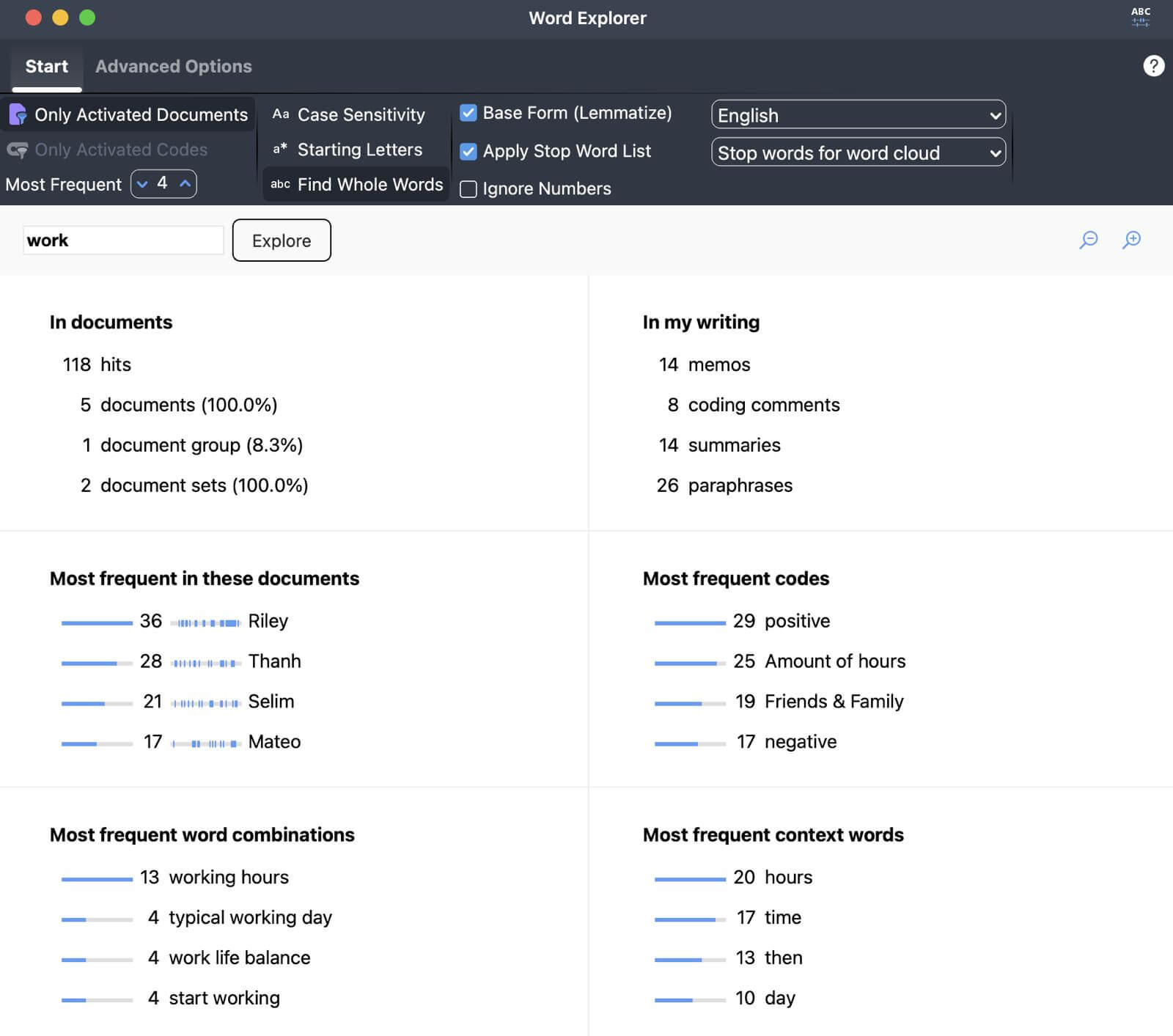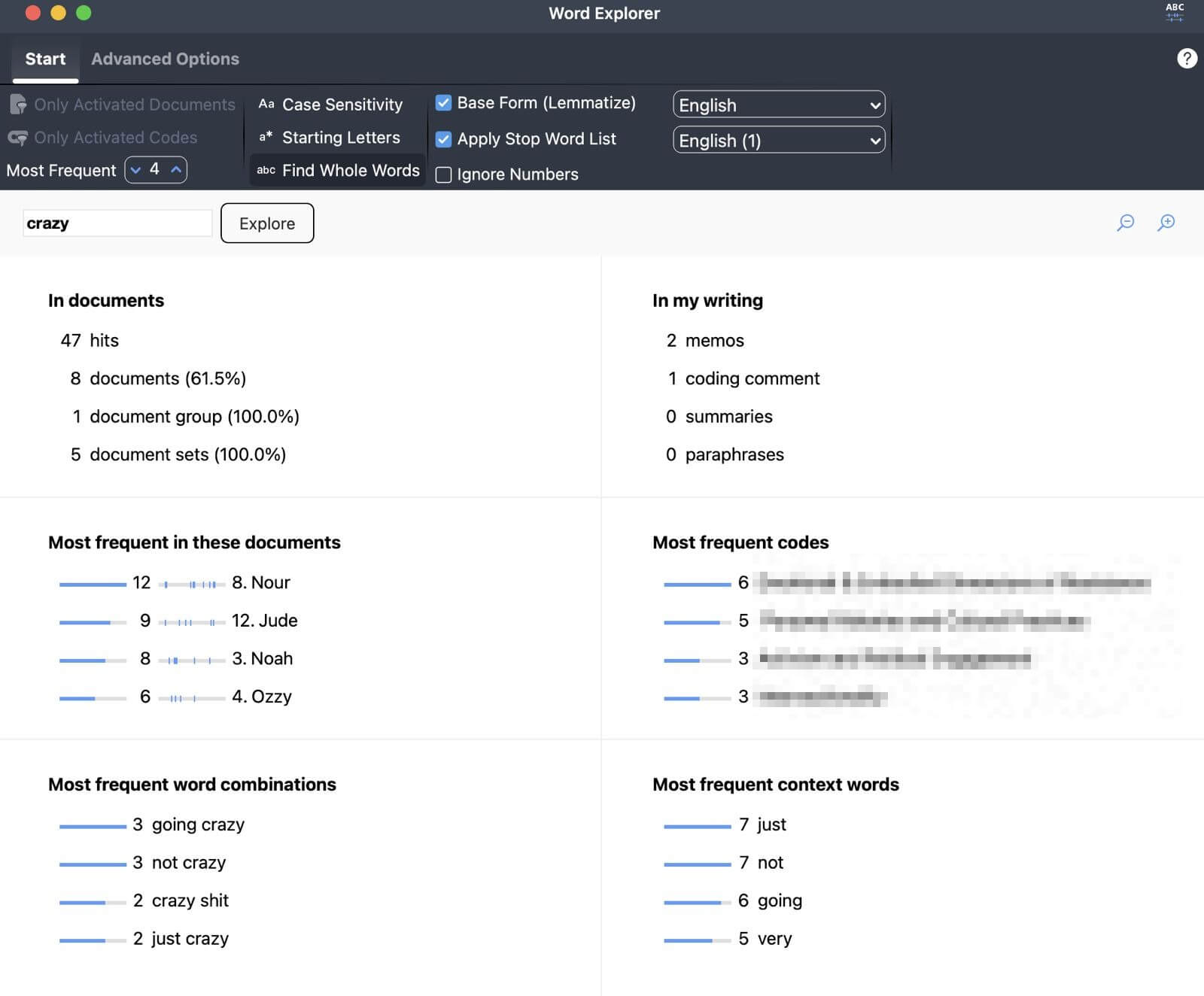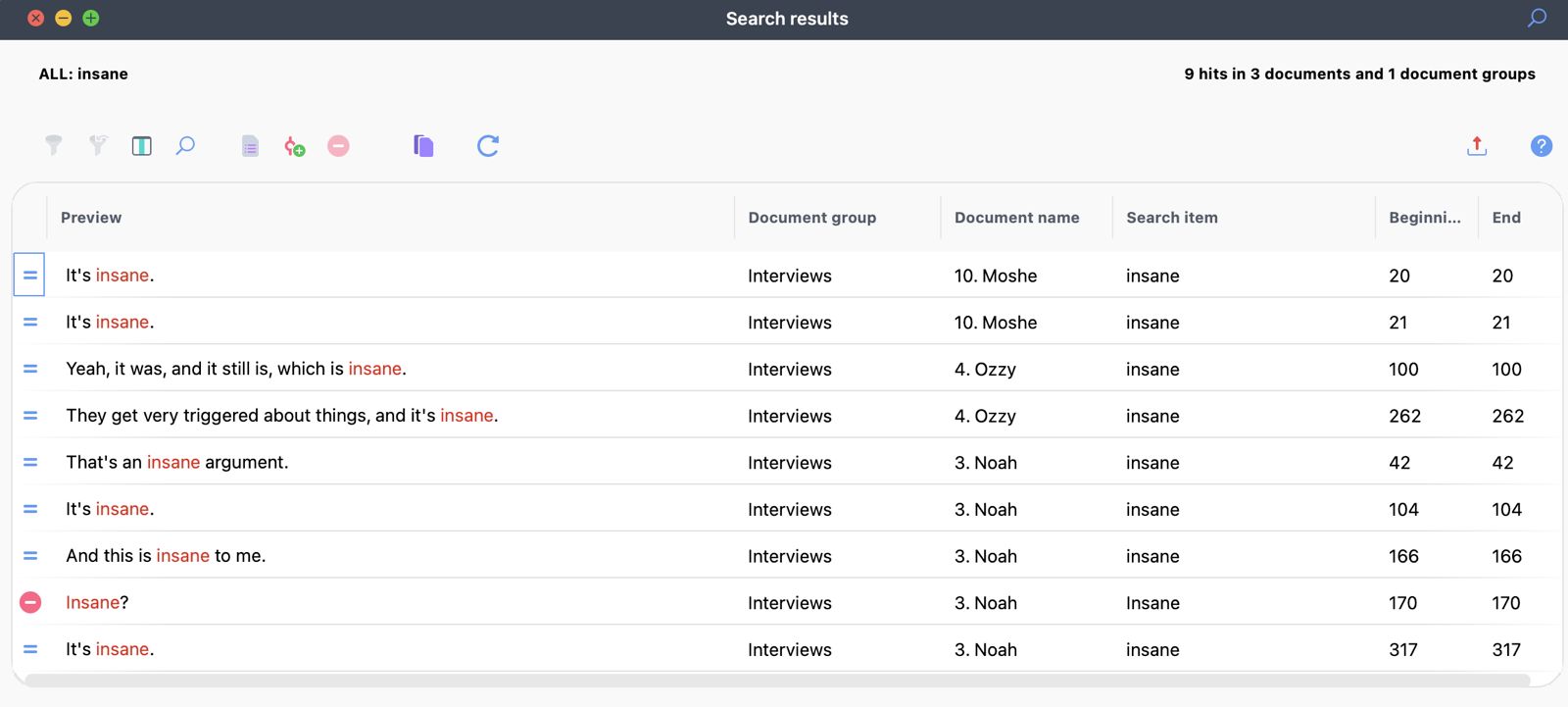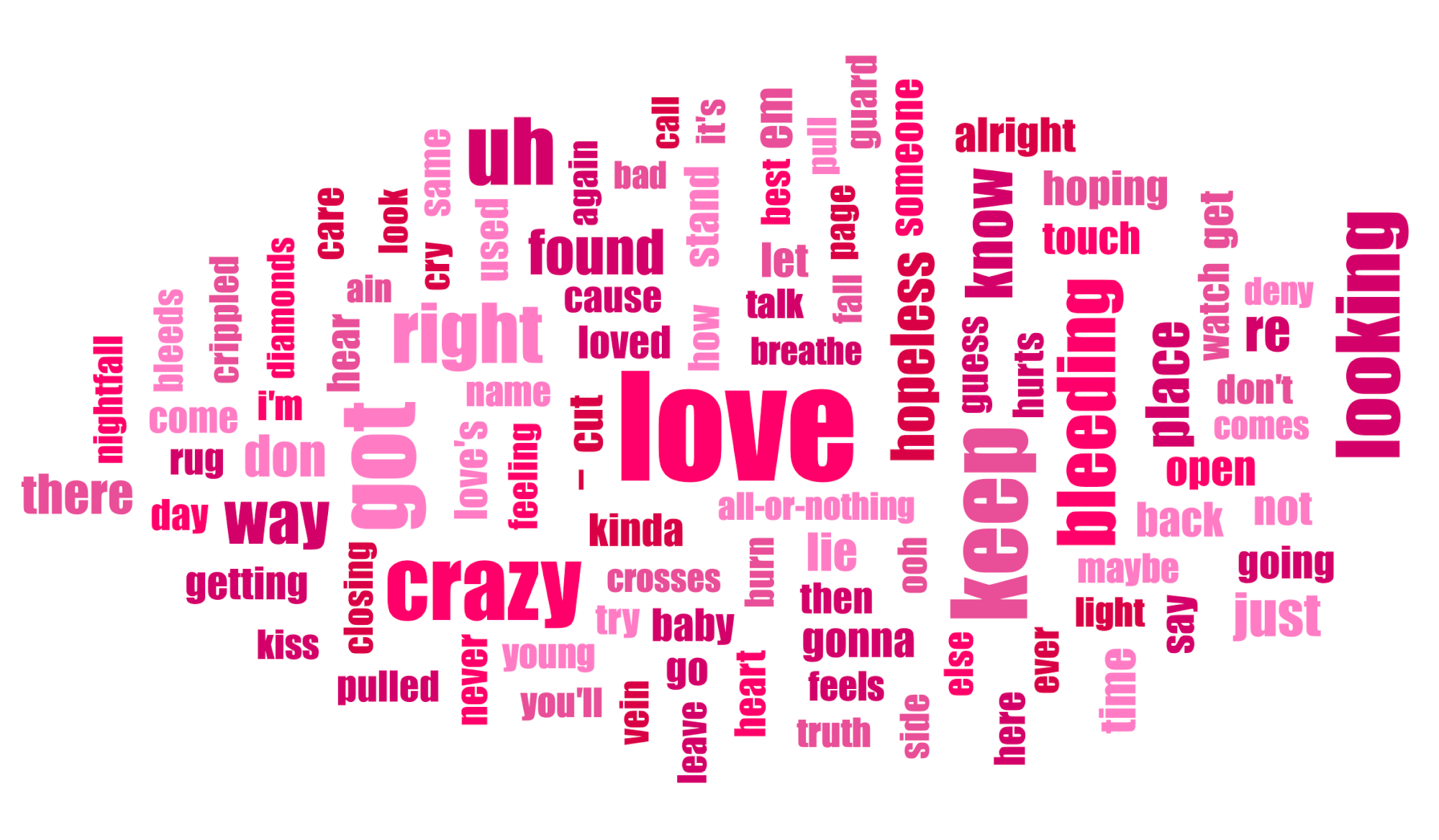Xan’s Journey with MAXQDA’s Word Explorer
Let’s be real: qualitative research can be brutal. I just submitted my thesis last month, and honestly? I’m still catching my breath. This post walks you through how MAXQDA’s Word Explorer helped me find structure, clarity, and analytical momentum while deep in the mess of emotionally intense qualitative data.
Wait, what is the Word Explorer?
To truly understand how this feature helped me crack open my analysis, it’s worth briefly explaining what Word Explorer actually does.
Word Explorer is a MAXQDA tool that lets you search for any word or phrase across your project, including interview transcripts, memos, paraphrases, coding comments, and summaries. But it’s not just a search bar. For each term you enter, Word Explorer organizes the data into six interactive sections: frequency across documents, your own writing, code associations, co-occurring words, and more. This made it possible for me to spot recurring expressions and understand where and how they gained significance.

The screenshot above shows MAXQDA’s sample project called “Work-Life Balance,” demonstrating what a Word Explorer search for the term “work” can reveal. Even in a demo dataset, the tool surfaces surprisingly useful patterns: the word appears in every document, shows strong links to codes like “positive” and “amount of hours,” and frequently pops up in phrases like “working hours” and “typical working day.” It’s a solid example of just how much contextual insight Word Explorer delivers.
Basically, it did what my spiraling code system couldn’t: showed me what actually mattered, not just what screamed the loudest. You can also check out this user manual page for a more detailed overview of the feature and how it works. I found the manual helpful for getting the full picture once I knew what I was looking for.
So, if you haven’t used it yet—or only glanced at it once—trust me when I say it’s worth a second and third look. Keep reading this blog post to see what I mean.
Drowning in emotionally dense data
My master’s thesis research focused on activists engaged in high-risk, emotionally charged political work in Germany. These individuals often operate at the edge of public discourse, hyper-visible when their presence serves a symbolic purpose, yet quickly marginalized or disciplined when their dissent becomes inconvenient.
Because of the sensitivity of the topic and the real-world risks participants face, I’ll be deliberately vague in this post about certain aspects of my project. That vagueness isn’t an oversight—it’s part of my effort to honor both their safety and the ethics of research confidentiality.
In total, I conducted 13 in-depth, semi-structured interviews. What emerged was a body of data that was not only intellectually complex, but emotionally overwhelming. Layered into the transcripts were moments of pain, disillusionment, resistance, and occasionally, dark humor. Many narratives pushed against dominant ideas about legitimacy, identity, and belonging. What I initially expected to be “challenging but manageable” quickly revealed itself to be a swirling archive of contradiction and emotional weight.
Often, I’d find myself staring at my screen, trying to make sense of the recurring dissonance participants expressed: a sense of being pulled in opposing directions, of seeing through systems but still being bound by them. How could I do justice to these accounts without flattening them into categories or stripping them of their edge?
When everything felt important
My main struggle when working on my research, and arguably in life in general, was that I felt compelled to include EVERYTHING. I mean, how could I possibly “honor” my participants and their narratives if I didn’t include EVERYTHING?
Yes, I knew intellectually that including everything would only sacrifice depth for breadth, resulting in a sprawling, unfocused findings section. But logic didn’t matter because how could I not do sentence-level discourse analysis of every single sentence uttered by every participant?
Spoiler: I tried. It didn’t go great.
Too many codes, not enough clarity
I wasn’t new to research, but this was my first full qualitative project in years. Within a week of beginning the analysis, my code system had exploded like a well-meaning monster.
Every paragraph in my transcripts seemed to contain three different concepts, five affective undertones, and at least one line that deserved to be a standalone theoretical paper. I was coding everything. And it was making everything worse.
Even the analytical groupings I thought would work (like distinguishing between front-facing activists versus behind-the-scenes contributors) didn’t hold up. People’s roles blurred. So did the themes. I’d scroll through my code system and think, “Is this still analysis, or did I accidentally start writing a novel with footnotes?”
The emotional chaos layer
The affective layer made it even messier. These weren’t dry policy interviews. People were angry, disillusioned, sarcastic, hopeful, and occasionally hilarious in the most unhinged ways. Their words didn’t fit neatly into categories like “exclusion” or “motivation.”
I developed codes like “state-defined legitimacy” or “epistemic silencing,” but I also had in vivo codes like “this is insane” or “makes you want to scream.” The tension between the analytical and the affective felt constant and paralyzing.
When a joke became a method
Here’s how Word Explorer entered the picture: I was venting to a friend. I remember saying something like, “Everyone keeps saying ‘this is crazy’ or ‘what the f***.’ It’s kind of funny.”
The friend, bless them, said: “Isn’t that, like, useful?”
Reader, it was.
I’d opened Word Explorer before, but never really got it. That day, I typed in “crazy” and “what the f***” just to see what would happen. What happened? A breakthrough.
To illustrate what I mean, here’s what Word Explorer showed when I searched for the term “crazy” across my own project:

Even without reading the transcripts, the patterns jump out. The term “crazy” appeared 47 times across 8 of the 13 interviews. That alone gave me a quick way to zero in on emotionally charged moments. But more than that, it helped me ask better questions. Why did it show up more often in some interviews than others? Was it the absence of the term in the remaining interviews or the absence of the sentiment?
This pushed me to look for synonymous expressions I had previously overlooked—phrases like “this is insane,” “makes you want to scream,” or even sarcastic side comments. I started mapping affective vocabulary more deliberately and could finally test whether themes like disbelief or absurdity were isolated quirks or part of a broader affective pattern.
From chaos to categories
At the time, MAXQDA didn’t have the synonym-enhanced search (By the way, it does now) so I made my own. I created lists: outrage expressions, disbelief phrases, sarcastic one-liners. And then I ran them through Word Explorer.
That realization only deepened as I continued, similar emotional phrases were clustering. They were surfacing in interviews I had coded very differently. This wasn’t noise; it was a signal.
What I found didn’t just validate my spiraling. It gave my thesis a spine, though not all at once. It was a slow, iterative process of typing in different words and phrases, checking their context, and slowly noticing patterns emerge.
Participants weren’t just venting. Some were questioning their own sanity. Others were using the language of absurdity they observed and experienced in surprisingly deliberate ways, flipping it to highlight the incoherence of the very systems trying to contain them.
That realization kicked off another cycle of analysis, where in vivo codes like “this is crazy” evolved into conceptual categories like “discursive absurdity” and “subversive absurdity.”
A great thing about Word Explorer is that once you click on the number of hits for a search term, you get an interactive list of segments. You can quickly review them within the results window, or click on any entry to jump straight to its context in the document, which is crucial when you’re trying to figure out whether a word is being used in similar ways.
Most of the emotionally rich examples I worked with aren’t shareable here due to confidentiality and political sensitivity reasons. However, to illustrate what this process looks like, I’ve included a more neutral example that I felt comfortable sharing publicly.
The term “insane” was part of my synonym list for expressions of disbelief. You’ll notice I’ve marked one of the hits with a stop icon, because this mention was in a follow-up clarification question and not something the participant said. Marking it this way lets me exclude it when automatically coding all the search hits.

Word Explorer didn’t give me a single “aha” moment but the scaffolding to keep digging. It helped me connect themes like repression, legitimacy, and emotional risk and see them as more than separate findings but as recurring expressions of absurdity woven throughout. And suddenly, the mess started to make sense.
What changed: From fragments to focus
Here’s what shifted in my process and why Word Explorer ended up being more than just a clever feature.
- Hidden patterns, shared undercurrents
Word Explorer helped me recognize that what looked like random expressions were anything but random. I initially thought they were one-off emotional outbursts. But the more I searched, the more I saw them echoing across every interview. These weren’t isolated feelings; they were shared affective undercurrents.
This reframed how I approached the data. It wasn’t just about identifying topics; it was about tracing affective logics. Disbelief, irony, alienation were a medium of political experience. And the participants? They were already doing the analysis. I was just finally listening properly.
- Absurdity as anchor
One affective theme in particular kept showing up: absurdity. Not always named outright, but always there in sarcasm, in side comments, in those moments where people laughed at the incoherence of it all. Word Explorer let me trace this subtle thread, and that changed everything. Absurdity wasn’t just a mood; it was a structural response to contradiction, repression, and political gaslighting. It became the core concept that held everything else together. Suddenly, my thesis had a narrative.
- Contradiction as clarity
This tool gave shape to things I hadn’t yet seen clearly. I had coded for topics like repression, identity policing, legitimacy. They were all there. But Word Explorer illuminated the affective thread that wasn’t obvious in my initial categorization: absurdity. These weren’t just parallel themes floating in chaos—they were connected by a shared affective logic. Absurdity wasn’t a detour from the data; it was the glue that made the contradictions make sense. It gave the findings narrative coherence instead of just analytical fragmentation.
- From Everything to what matters
One of the hardest parts of qualitative work is that gut feeling that everything is important. Like, how could I ethically skip over anything? I had hundreds of pages of transcripts and a deep existential need to honor every sentence.
But Word Explorer made it easier to zoom out. It showed me what was most frequent, what hit with the most emotional charge, and what kept showing up across contexts. It gave me permission to focus. And that shift, from coding everything to following patterns, was what finally made writing possible.
Final thoughts: clarity in the chaos
Looking back, Word Explorer didn’t just help me analyze my data; it helped me survive it. It pulled me out of the endless scroll of codes and into a place where I could finally start to see the shape of my findings. It gave me traction in a project that often felt like emotional quicksand.
For anyone navigating difficult, emotionally messy research: don’t underestimate what a well-placed tool can do. Word Explorer didn’t simplify the data, and it didn’t reduce the emotional weight but it gave me a way to work with both. And in a project like mine, that made all the difference.
So if you’re staring down a wall of messy transcripts, hoping for a signal in the noise, try typing something—anything—into Word Explorer. You might not find answers right away, but you may find a way in.
About the author

Xan (he/him) recently completed a master’s degree in sociology. He now works at VERBI Software, where he spends his time testing AI prototypes, writing about MAXQDA, and occasionally surviving thesis flashbacks by turning them into blog posts.



